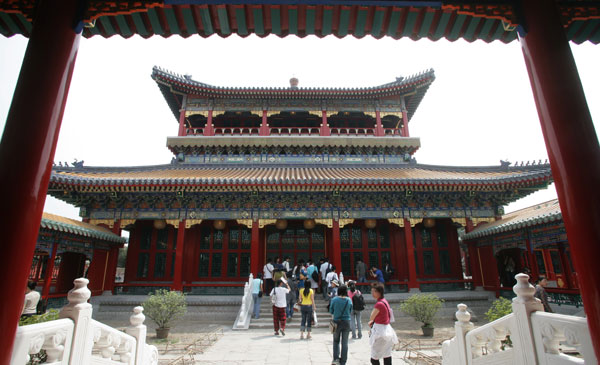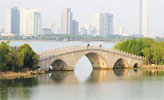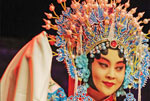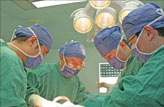Society
Critics decry Forbidden City's club
Updated: 2011-05-16 08:08
By Cheng Yingqi (China Daily)
BEIJING - After coming under criticism last week for having security too lax to prevent the theft of precious artworks, the Palace Museum found itself in the center of a controversy again over the weekend.
|
 |
|
Reporters visit the Jianfu Hall in the Palace Museum in this file photo. Provided to China Daily |
This time the museum, also called the Forbidden City, was the object of blame for its decision to turn its Jianfu Hall, which refers to several buildings and a garden, into a private club.
The newest troubles started several days ago, when a netizen wrote on the Internet that he had received an invitation letter from the Palace Museum after attending an opening ceremony held at Jianfu Hall.
On Wednesday, Rui Chenggang, an anchor on China Central Television, disclosed on his micro blog that Jianfu Hall had been converted into a private club that is open only to the rich and is so exclusive that no more than 500 people can obtain memberships. Rui's message was forwarded online more than 18,900 times.
| ||||
The garden of the Jianfu Hall, also known as the West Garden, was built in 1740 and was the second largest garden in the Palace Museum.
It was ruined by a fire in 1923, and repaired in 2005 with the sponsorship of the China Heritage Fund. Even so, the hall and the garden have not been reopened to tourists.
On Friday morning, the museum responded to the criticism over its use of Jianfu Hall with a clarification written on its own micro blog. The post said the Jianfu Hall garden is often the site of academic conferences or a place where distinguished guests are entertained - but not a private club.
Even so, netizens on the next day disclosed new evidence to the contrary - photos of an agreement made between Jianfu Hall and members of the private club.
The agreement said that members, as well as their spouses and guests, could enjoy the privilege of holding banquets and conferences at the hall if they paid membership fees regularly.
The agreement was signed by the Forbidden City Culture Development Co Ltd, a company that the Palace Museum has invested in. When China Daily tried to confirm the existence of the agreement, a staff member said the company does not answer questions from the media.
Since March, the company had posted ads soliciting chefs, waiters, bartenders and security guards but it deleted most job offers related to catering services over the weekend.
On Saturday night, Rui Chenggang said on his micro blog that becoming a member at Jianfu Hall cost 1 million yuan ($154,000).
The spokesman of the Palace Museum could not be reached on Sunday to verify what Rui had said.
Liu Chaoying, deputy director of the Beijing municipal administration of cultural heritage, said purely commercial ventures should not operate in State-owned historical and cultural sites like the Palace Museum.
"You can find a restaurant or a caf in every museum around the world, for example in the Louvre," Liu said.
"But the eateries are meant to better serve the tourists and reflect the cultural characteristics of the site, not just to make money."
E-paper

Green works
Wuxi becomes 'test case' for facing country's environmental challenges
The global rise of Chinese brands
China-EU trade on solid ground
ZTE banks on innovation
Specials

The song dynasty
There are MORE THAN 300 types of Chinese operas but two POPULAR varieties are major standouts

Cut above the rest
One of the world's oldest surgeons has performed more than 14,000 operations

From the ground up
Architect of Guangzhou Opera House has many projects under way, including 2012 Olympics.


